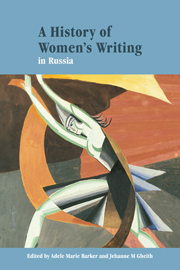Book contents
- Frontmatter
- Contents
- Notes on contributors
- Acknowledgments
- Note on transliteration
- List of abbreviations
- Introduction
- 1 Women's image in Russian medieval literature
- 2 Sappho, Corinna, and Niobe: genres and personae in Russian women's writing, 1760–1820
- 3 The inexperienced muse: Russian women and poetry in the first half of the nineteenth century
- 4 Women of the 1830s and 1850s: alternative periodizations
- 5 “A particle of our soul”: prerevolutionary autobiography by Russian women writers
- 6 The women of Russian Montparnasse (Paris, 1920–1940)
- 7 Women in Russian Symbolism: beyond the algebra of love
- 8 The eastern path of exile: Russian women's writing in China
- 9 Realist prose writers, 1881–1929
- 10 Women and gender in post-symbolist poetry and the Stalin era
- 11 Writing the female body politic (1945–1985)
- 12 In their own words? Soviet women writers and the search for self
- 13 Women's poetry since the sixties
- 14 The persistence of memory: women's prose since the sixties
- 15 Perestroika and post-soviet prose: from dazzle to dispersal
- Bibliographical guide to writers and their works
- Guide to further reading
- Index
- References
Bibliographical guide to writers and their works
Published online by Cambridge University Press: 22 September 2009
- Frontmatter
- Contents
- Notes on contributors
- Acknowledgments
- Note on transliteration
- List of abbreviations
- Introduction
- 1 Women's image in Russian medieval literature
- 2 Sappho, Corinna, and Niobe: genres and personae in Russian women's writing, 1760–1820
- 3 The inexperienced muse: Russian women and poetry in the first half of the nineteenth century
- 4 Women of the 1830s and 1850s: alternative periodizations
- 5 “A particle of our soul”: prerevolutionary autobiography by Russian women writers
- 6 The women of Russian Montparnasse (Paris, 1920–1940)
- 7 Women in Russian Symbolism: beyond the algebra of love
- 8 The eastern path of exile: Russian women's writing in China
- 9 Realist prose writers, 1881–1929
- 10 Women and gender in post-symbolist poetry and the Stalin era
- 11 Writing the female body politic (1945–1985)
- 12 In their own words? Soviet women writers and the search for self
- 13 Women's poetry since the sixties
- 14 The persistence of memory: women's prose since the sixties
- 15 Perestroika and post-soviet prose: from dazzle to dispersal
- Bibliographical guide to writers and their works
- Guide to further reading
- Index
- References
- Type
- Chapter
- Information
- A History of Women's Writing in Russia , pp. 313 - 364Publisher: Cambridge University PressPrint publication year: 2002



